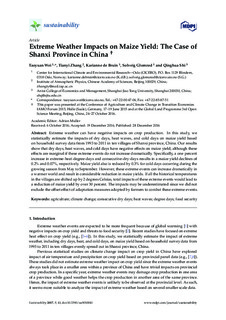Extreme weather impacts on maize yield: The case of Shanxi Province in China
Peer reviewed, Journal article
Published version
Permanent lenke
http://hdl.handle.net/11250/2465268Utgivelsesdato
2017Metadata
Vis full innførselSamlinger
- Journal articles [478]
Originalversjon
10.3390/su9010041Sammendrag
Extreme weather can have negative impacts on crop production. In this study, we statistically estimate the impacts of dry days, heat waves, and cold days on maize yield based on household survey data from 1993 to 2011 in ten villages of Shanxi province, China. Our results show that dry days, heat waves, and cold days have negative effects on maize yield, although these effects are marginal if these extreme events do not increase dramatically. Specifically, a one percent increase in extreme-heat-degree-days and consecutive-dry-days results in a maize yield declines of 0.2% and 0.07%, respectively. Maize yield also is reduced by 0.3% for cold days occurring during the growing season from May to September. However, these extreme events can increase dramatically in a warmer world and result in considerable reduction in maize yields. If all the historical temperatures in the villages are shifted up by 2 degrees Celsius, total impacts of these extreme events would lead to a reduction of maize yield by over 30 percent. The impacts may be underestimated since we did not exclude the offset effect of adaptation measures adopted by farmers to combat these extreme events.
